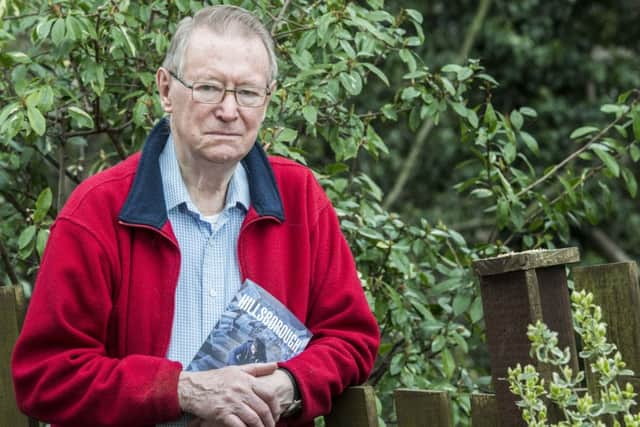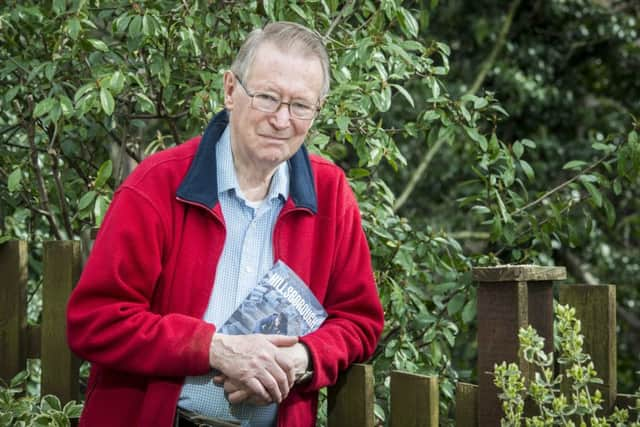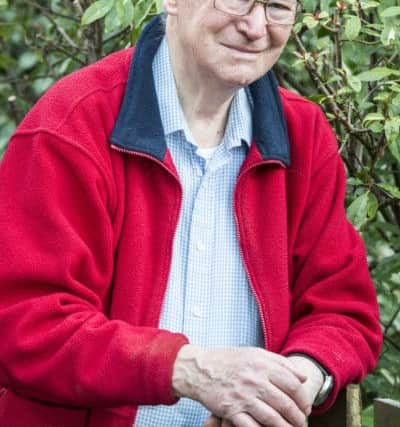Interview: I want the readers to realise there were people who could have made a difference...'


The memories are still very vivid,” says the Rev Brian Cranwell, explaining how he witnessed first hand the aftermath of the Hillsborough disaster on April 15, 1989.
The retired priest was chairman of the charity Cruse Bereavement Care at the time of the tragedy, in which 96 football fans lost their lives in a fatal crush on the terraces at Sheffield Wednesday’s ground during an FA Cup tie.


Advertisement
Hide AdAdvertisement
Hide AdOn the day, he was poised to take a wedding when he heard the voice of football commentator John Motson on TV speaking direct from Hillsborough, reporting that there had already been deaths.
“It was obvious something was up,” says Brian, aged 85. He led the service as planned before Cruse’s head office made contact.
“I thought I would go to Hillsborough and see what was happening. I didn’t know what to expect when I got there. It was cold and miserable, with a bit of a drizzle outside.
“There was a big crowd of photographers and press, with police at the gate.


Advertisement
Hide AdAdvertisement
Hide Ad“I just walked through – nobody asked me who I was or anything.
“And there was nobody organising these people – relatives waiting to view bodies.”
Brian didn’t venture on to the pitch, but stayed at the stadium overnight, organising help and care for those seeking news of the injured and dying.
“There was no contingency planning,” he says, his words punctuated by the sound of trains passing on the railway line beside his home in Totley.


Advertisement
Hide AdAdvertisement
Hide Ad“It’s social services’ responsibility to look after relatives and people who might be searching for bodies, not the police.”
Brian has expanded on his arguments by writing a new book.
He contends that, while the jury at the inquests last year found fault with the ambulance service, Sheffield Wednesday and other agencies, discussion has been focused on the shortcomings of the police.
Promising a ‘fresh perspective’, he claims the disaster should not have come as a surprise to those in positions of authority, including Owls directors at the time.


The jury – which returned an overall verdict of unlawful killing – found there were defects with the stadium, no safety certificate, and that there were ‘errors or omissions’ by Wednesday and its staff in the run-up to the match and on the day.
Advertisement
Hide AdAdvertisement
Hide AdThe club’s engineers ‘should have done more’ to find safety flaws and offer advice, jurors also concluded.
“It’s looking at the precedents and how this would have been avoided if people had taken responsibility for their jobs, and for the club,” says Brian.
“I want people to realise that there were other people who could have made a difference, not just the police.
“All the emphasis has been on the police actions – letting people through the gates, and blaming them for rushing the gates.”
Advertisement
Hide AdAdvertisement
Hide AdThe book – called Hillsborough: Profit Before People – was inspired by Sir Stanley Matthews’ autobiography, who criticised clubs for treating supporters as ‘terrace fodder’.
“I got the satisfaction of putting on paper things I knew that other people didn’t,” says Brian.
“It’s never been publicised that St John’s Ambulance were asked to do a certification of safety on the ground to assess whether it was suitable for international matches by the FA.”
The clergyman grew up in north London near Alexandra Palace – tall, and now ‘slightly hard of hearing’, he’s never lost his accent. Despite considering the priesthood, he didn’t go into the church until the age of 50, leading an extremely diverse life beforehand.
Advertisement
Hide AdAdvertisement
Hide AdAfter leaving school he joined the RAF as a radar fitter, then went to Kenya, where he was inspector of police during the Mau Mau uprising against colonial rule.
Brian then moved into Africa’s plantation industry, working as training manager for the Brooke Bond and Booker groups.
He reached Sheffield in 1972, studying for a masters degree in management at the old polytechnic before acting as a consultant for 10 years. Meanwhile, Brian’s wife Hazel – who died last year – took a job in teacher training.
“We liked it here and stayed here. I like Sheffield very much. It’s friendly. Here you get on a bus and if you start talking to someone, they will respond very quickly.”
Advertisement
Hide AdAdvertisement
Hide AdBut the calling persisted and he was accepted for theology training at Durham University. He was vicar of Ecclesfield, then Woodhouse for 13 years, retiring in 1999 aged 67.
Brian – who has two grown-up sons, Jonathan and Paul, and four granddaughters – has written several books previously, including a collection of memoirs and a guide to helping children cope with grief.
With the investigations into Hillsborough still ongoing, the disaster is certain to remain a topic of debate for some time to come, but Brian thinks the public have ‘put it behind them’ to some extent. “I think there has been a great deal of ‘Oh, not Hillsborough again’, but that’s without understanding the fact that there was obviously so much kept hidden. Once that was revealed people realised why the Liverpool people kept going. There was a lot of admiration for them.”
* Hillsborough: Profit Before People is available in paperback via online booksellers, published by New Generation, priced £6.99.
‘If it’s the right calling for you, you’ll be back’
Advertisement
Hide AdAdvertisement
Hide AdRev Brian Cranwell only joined the church aged 50 – but had thought about becoming a vicar since he was a teenager.
“I had an interview with a bishop in London in 1961 – I hadn’t been married very long and he wisely said: ‘You’ve got a vocation you’ve just started, you’d better make that good first, and you’re doing some good work in Africa so if it’s the right calling for you, you’ll be back’.
“It was a very wise decision actually, I think it would have been hard. I’ve seen one or two clergy marriages break up. It’s a very different way of life and especially for the wife of the priest.
“Now, of course, women are priests as well. It’s probably difficult for some of their husbands!”
Advertisement
Hide AdAdvertisement
Hide AdHe is now helping to lead a committee run by the Sheffield Diocese, concentrating on the needs of older people.
“I’ve come across some fascinating stuff. Despite the fact that the church’s raison d’etre is saying ‘There is more to this life than this life’, nobody talks about death.
“It’s as if it’s something to avoid, unless there’s a funeral, and then you’re confronted with it.
“We’re setting up a special website about the needs of older people – problems of ageing, family break-ups, living with your own mistakes.”
Advertisement
Hide AdAdvertisement
Hide AdRIP - Two sisters, three pairs of brothers, and a father and son were among those who died.
HILLSBOROUGH FINDINGS
41 Hillsborough Independent Panel concluded that “up to 41” of the 96 who died might have survived had the emergency services’ reactions and co-ordination been improved.